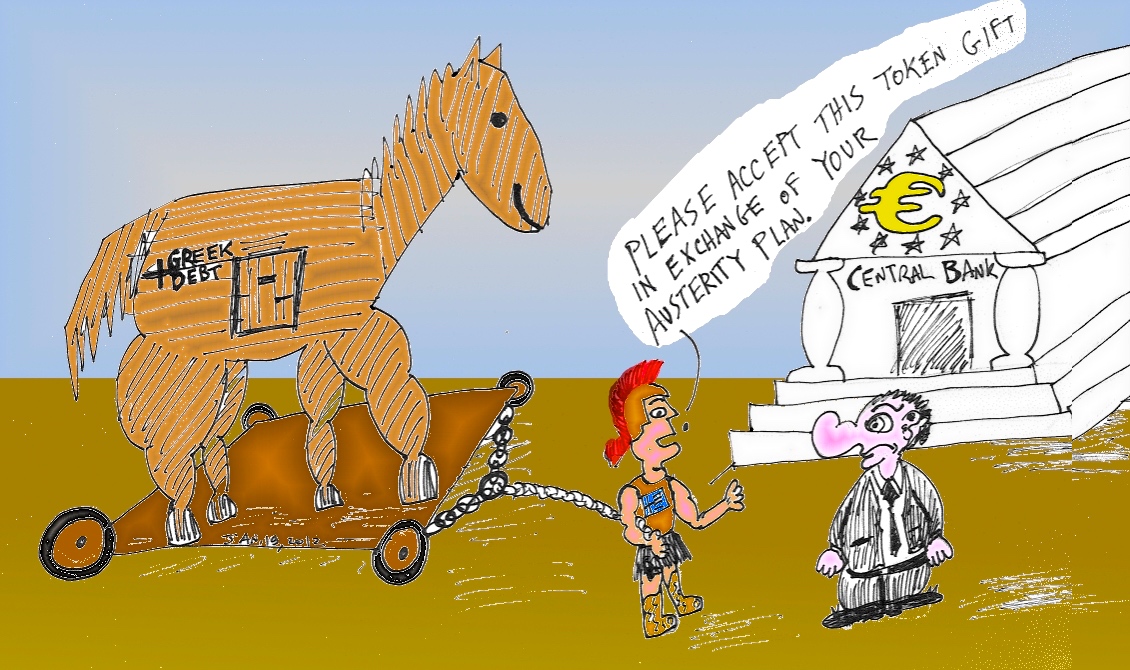
On Sunday, Jan. 25, Greece's far-left party Syriza swept to victory, gaining 149 of 300 seats in Greek parliament. Then, last Thursday, the country's new Prime Minister Alexis Tsipras met with the German President of the European Parliament, Martin Schulz, to discuss the issue of Greece's $279 billion debt, which has grown to a staggering 175% of Greece's GDP. There are widely expressed fears that Syriza might push Greece to default on this debt. Party officials are adamant this is not their vision, although in the first days following the election there is still no clear indication of what exactly they plan to do.
Shaking hands with Tsipras before the meeting, Schulz joked about the fact that Tsipras was not wearing a tie, perhaps a dig intended to warn the radical PM against any outrageous proposals. A full report on the meeting wasn't released, but Schulz employed a somewhat more respectful and conciliatory tone afterwards, announcing: “I hope that your country will remain on a European course as it has always done,” and commenting that the two men had agreed on many of the issues they discussed. Schulz then took to Twitter to conclude: "There's a sense in E.U. that Greek gov't will follow own course. I see that's not the case.”
When Tsipras and Greece's newly appointed Finance Minister, Yanis Varoufakis, met at the end of the week with Eurogroup President Jeroen Dijsselbloem, Varoufakis arrived riding a Yamaha 1300 CC motorbike, sparking further speculation from conservative quarters over whether or not the Syriza party is “professional” enough to tackle the enormous challenges it faces. Meetings with British Chancellor of the Exchequer George Osborne, French Finance Minister Michel Sapin, and Italian Finance Minister Pier Carlo Padoan, are scheduled for this week. In a statement, the Greek finance ministry said the meetings represent “the start of negotiations with our partners which will lead us to a viable and comprehensive solution for the reconstruction of our social economy in the framework of a developing Europe."
Greece has been in financial turmoil since 2009, a situation often attributed to inherent weaknesses in the country's financial system, as well as high structural deficits and debt-to-GDP levels on public accounts. On May 2, 2010, the European Commission, European Central Bank and International Monetary Fund, known as the “Troika,” gave a €110 billion bailout loan to help Greece from May 2010 through June 2013. The conditions of the loan included the implementation of austerity measures, structural reforms and privatization of government assets.
The burden of that debt has meanwhile had a devastating effect on employment figures, with 25% of the overall population and 60% of young people out of work. Indeed, many consider Greece to no longer qualify as a “developed” country. Yet in cases when other “developing” countries ask for help with debt, there is often considerably more sympathy from the international community.
“Greece has always had a peculiar position in Europe,” political analyst Lewis Baston told Occupy.com late last week. “It joined the European Community in 1981, only seven years after the fascists were kicked out – Central and Eastern Europe took 15 years after communism – and part of the purpose, in Greece and in the E.U., was to consolidate democratic norms in Greece and save it from relapsing, or from revolution."
"Democratic institutions were arguably not firmly established enough," he added, and "the same happened with economic integration. The criteria were fudged (read: evaded) when it joined the Euro, with the connivance of everyone.”
Baston, like many observers, blames much of the country's financial troubles on the greed of the rich – a growing inequality that is sharply taking its toll on the poor. “From the Greek point of view the E.U. was happy enough to look the other way and bend the rules when it suited them. It also did not insist on adequate anti-corruption measures, or free market reforms that would break the power of the oligarchs," Baston added.
"Now the E.U. insists on austerity measures that are causing misery to ordinary Greek people in the interests of creditors. Greece now runs a current budget surplus, which hardly anyone else does. If the E.U. is okay with bending all sorts of other rules for various reasons, repeatedly, for the Greek elites, why should financial criteria not also be negotiable in the interests of respecting a democratic mandate and preserving democracy and sovereignty in Greece? There are many cases in the "Third World," Latin America, etc, where debts have been cancelled or deferred,” he concluded. “Why not when a semi-revolutionary change happens through a democratic election?”
Syriza is expected to unveil its policy plans in Parliament this week. While early indications suggest the incoming leaders of Syriza may not be as extreme as some first expected, it's clear the party is angling for a drastic shake-up of the Greek – and perhaps, by implication, the European – political landscape.
3 WAYS TO SHOW YOUR SUPPORT
- Log in to post comments














